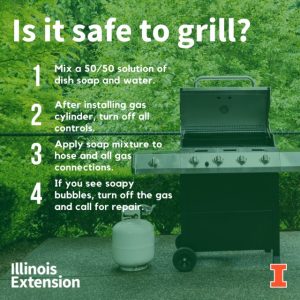Grilling mistakes can be costly; stay safe during cookout season
University of Illinois Extension Services — July 16, 2021 Grilling is a great way to keep the kitchen cool while enjoying fresh summer foods. But the thrill of cooking outside can quickly be extinguished by a fire.
Grilling is a great way to keep the kitchen cool while enjoying fresh summer foods. But the thrill of cooking outside can quickly be extinguished by a fire.
Fire departments respond to about 5,700 residential grill fires annually, most of which are between May and August, according to the Federal Emergency Management Agency’s U.S. Fire Administration.
These fires cause an estimated $37 million in damages annually and result in thousands of emergency room visits.
“The best way to prevent damages and injuries when grilling is to maintain your equipment,” says Diane Reinhold, University of Illinois Extension nutrition and wellness educator and registered dietitian.
The leading cause of grill fires is mechanical failure or malfunction. Grill owners should do a safety check annually as well as every time the cylinder, hose, or regulator is disconnected.
Gas grills have a higher fire risk than charcoal because of leaks or breaks in pieces. Leaks can be caused by improperly sealed connections, cracked or split hoses, or damage from wildlife. Also, that the regulator connection doesn’t become clogged, Reinhold says.
To inspect a gas grill, start by mixing a 50/50 solution of dish soap and water. After installing a gas cylinder, turn all controls to the off position. Open the gas cylinder by turning the valve one rotation to the left. Then, lightly apply the soap mixture to the hose and other gas connections. If soapy bubbles form, there is a gas leak. Turn off the gas and do not attempt to grill.
Check connections to see if they need to be tightened, then do another soap test. If the leak continues, contact a professional for service. Attempting to fix the leak yourself may lead to potentially dangerous situations.
Reinhold says the leading factor contributing to grill-related fires is a dirty grill. The build-up of grease and fat may lead to the grill overheating and could melt plastic dials and flexible hoses, warp metal, and crack ceramics.
“Contrary to popular belief that a seasoned grill provides the most flavor, it is crucial to clean grates, burners, side tables, and the grease trap,” Reinhold says.
If the tiny holes where gas escapes become clogged by food, the flames will be unevenly distributed, resulting in hot or dead areas on the grill.
Always follow the manufacturer’s instructions for cleaning grills. Regular cleaning will help ensure the grill is performing at its best and extend its life.
It will also help prevent food from being contaminated by harmful bacteria lingering in old grease. In warm weather, grease and oils on grates or the bottom of the grill can quickly become rancid. This grease can vaporize and give food an off flavor.
THE KITCHEN DIVA: Discover the joys of cooking over an open campfire







